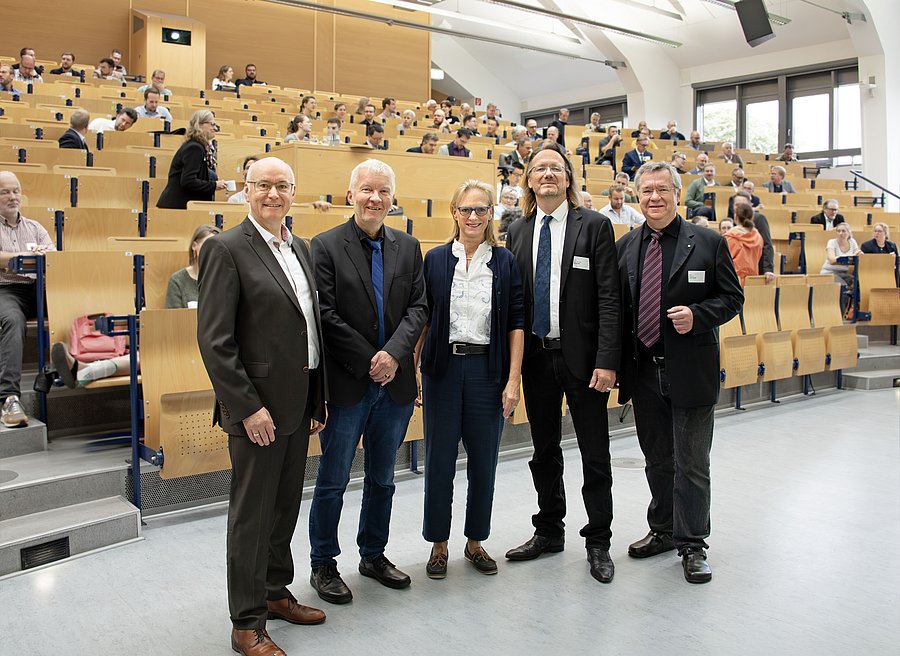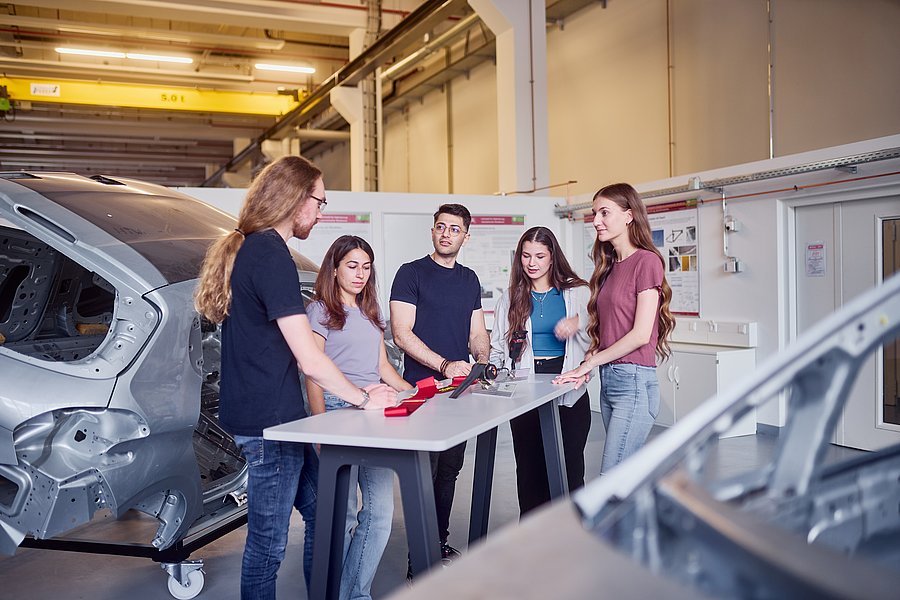Study the future
A unique subject in Germany celebrates its birthday: 50 years of safety engineering at the university of Wuppertal

Christoph Benning (VDSI), Prof Dr Ralf Pieper (University of Wuppertal, Safety and Quality Law), University Rector Prof Dr Birgitta Wolff, Prof Dr Stefan Bracke (University of Wuppertal, Reliability Engineering and Risk Analysis) and Dean of Faculty Prof Dr Eberhardt Schmidt at the Wuppertal Safety Day 2025 // Photo Friederike von Heyden
Safety engineering in Wuppertal is a subject with a unique profile. "Safety engineering is only taught and researched in this breadth and interdisciplinarity in Germany in Wuppertal," reports Prof Dr Stefan Bracke, who heads the Chair of Reliability Engineering and Risk Analysis at the University of Wuppertal. "A jewel," he emphasises, "that needs to be protected in times of incomprehensible cost-cutting measures in the field of education." He also explained what he means by this at the Wuppertal Safety Day on Thursday, where the department celebrated its 50th anniversary together with 150 guests on site and 100 participants connected via livestream. Bracke: "We don't have any raw materials in Germany that enable us to prosper, but we do have committed and inquisitive young people. It doesn't make sense to save on their education and thus on the future of all of us." Change is only possible with excellent expertise.
Study safety engineering
Safety science deals with the risks to which people and their environment are exposed, especially when dealing with technology. Safety engineering focuses in particular on the occurrence of risks, assessment methods and the optimisation of protection concepts. The course covers a broad field of safety, resulting in a variety of specialisation options in occupational safety, fire protection, civil protection and environmental safety, which is only offered in Wuppertal. The degree programme is also characterised by its strong practical relevance, close supervision by lecturers and tutors, early contact with companies and the personal working atmosphere.
This information video (link to YouTube) shows why studying Security Engineering in Wuppertal is a good idea and what students can expect.
Further information on studying and applying can also be found in the programme profile.
Answers to complex questions
From internal security to cyber and energy security to the smallest details of product safety - the increasing complexity of processes, infrastructures and technologies requires experts who can analyse and assess risks and make them manageable. This is precisely where safety engineering comes in: It develops methods and concepts to avoid or minimise risks to people and the environment. "In this way, the subject makes an important contribution to achieving the United Nations' global sustainability goals," emphasises Ralf Pieper, Professor of Safety and Quality Law. These include the goals of "quality education", "industry, innovation and infrastructure" and "health and well-being".
In demand everywhere
"Our graduates are in demand in all sectors - from industry and healthcare to research, administration, civil protection and consulting," said Pieper at the anniversary celebration. A look at the specialist areas that make up safety engineering at the University of Wuppertal shows why this is the case: students receive a sound engineering education that combines technical and psychological principles with the topics of occupational safety, ergonomics, environmental safety, traffic safety, process and plant safety, product safety and quality, fire prevention, fire dynamics, chemical safety, civil protection, disaster relief and property safety, reliability engineering and risk analysis, safety and quality law as well as socio-technical systems. "My colleagues have studied chemistry, medicine, physics and psychology, among other subjects, and are now using this as a basis for their well-founded safety engineering work," noted Faculty Dean Prof Dr Eberhard Schmidt. This makes safety engineering in Wuppertal a cross-sectional, almost universal discipline.
This is also reflected in the career of graduate Ole Hans: he began his studies in Wuppertal in 2016. Like many others, he initially wanted to work in occupational safety or for the fire brigade. "But because the degree programme is so diverse, I tried things out and came to the decision to do my Master's in quality engineering, only to realise afterwards that it wasn't quite right for me and I went back to safety engineering." Today, he uses his extensive knowledge for the automotive industry. "This trial and error makes the degree programme very unique," says Hans.
Christoph Benning also studied in Wuppertal. From his work as a board member of the Association for Safety, Health and Environmental Protection at Work (VDSI), he can confirm: "Everyone I know gets on very well with what they have learnt here in Wuppertal and can apply it well - professionally, methodically and communicatively." And addressing the next generation, he says: "What could be better than ensuring safety?" You get the necessary tools for this in Wuppertal.

Safety belts offer protection in various aspects of life - prospective safety technicians learn how to test them during their studies // Photo Peter Gwiazda
Research for society
At the anniversary day, the professors and research assistants in the field of safety engineering provided insights into their research - from fire protection and technical reliability to occupational safety and materials science to social issues relating to safety. The eight contributions were a selection from a new comprehensive work on safety engineering. The new book, published in English under the title "Safety Engineering - Fundamentals, Methods, Research topics" by Prof Bracke and Prof Pieper, was published just in time for the anniversary. "Our aim with the conference proceedings is to present the many facets of safety engineering and what it has to offer. This resulted in 20 contributions from a total of 80 authors," says Prof Bracke.
Above all, these would show that research at the University of Wuppertal is not just carried out in a "quiet little room", as University Rector Prof Dr Birgitta Wolff emphasised in her welcoming address at the Security Day. Nor would that make sense for society. "We encounter the topics of safety technology every day - it is not just a life saver; safety technology should be seen as an accelerator, many technical developments would be inconceivable without it," said Wolff. Many jobs would certainly be lost if companies were unable to remain innovative with the help of safety technology and ergonomics.
And in the future?
"Of course we are also concerned with the further development of our discipline," explains Prof Bracke. Whether it's new fields of application brought about by artificial intelligence or the offer of new degree programmes, such as the Bachelor's degree in Industrial Engineering and Management, which is well advanced in the planning stage.
In the meantime, other education providers have also included the subject of security technology in their portfolio, albeit not in the interdisciplinary breadth as in Wuppertal. "Ultimately, this helps to spread safety engineering and to promote innovation and competition," summarises Prof Pieper, who looks to the future of safety engineering in Wuppertal with hope and confidence.
At a glance
The first university department with an interdisciplinary safety science concept was established at the University of Wuppertal in 1975. The specialisation has been an integral part of the school of mechanical engineering and safety engineering since 2015. In addition to the now 13 chairs, several institutes and spin-offs have been established.
It currently offers the Bachelor's degree programme in Safety Engineering, which is also available as a dual degree, and the two Master's degree programmes in Safety Engineering and Quality and Reliability Engineering.
A wide range of national, European and international collaborations are an expression of lively networking, including for the further development of research and teaching, and are characterised by the transfer of knowledge. The professors' scientifically sound consulting expertise is in demand at political, association and company level. This is expressed, for example, in advisory board and consultant activities.
Security Science Forum
Once a year, the Department of Safety and Quality Law at the University of Wuppertal, together with the VDSI regions of Bergisches Land, Düsseldorf, Cologne, Ruhr-Niederrhein and Westphalia, organises the Safety Science Forum and VDSI Forum NRW in cooperation with the Institute for Occupational Medicine, Safety Engineering and Ergonomics (ASER) in Wuppertal. This year, the organisers combined the forum with the Wuppertal Safety Day to mark the 50th anniversary of safety technology. The Safety Science Forum regularly reaches around 300 occupational safety specialists and occupational safety, health and environmental protection experts and is offered on a hybrid basis. The forum will also be held again in September 2026.
